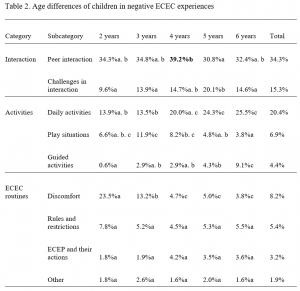 Professor Hui-Chun lee from Tzu-Chi University and Li-Chen Wang from Chung Gung University in Taiwan have written an article about children’s social orientations in Taiwan based on the Progressive Feedback data. The participants were 366 Taiwanese three- to six-year-old children in day care centers. The children were interviewed to collect their perspectives. The results indicated that the adaptive-accommodative
Professor Hui-Chun lee from Tzu-Chi University and Li-Chen Wang from Chung Gung University in Taiwan have written an article about children’s social orientations in Taiwan based on the Progressive Feedback data. The participants were 366 Taiwanese three- to six-year-old children in day care centers. The children were interviewed to collect their perspectives. The results indicated that the adaptive-accommodative
orientation is the most frequent in the teacher situations. The second most frequent response was the agentive-accommodative orientation. Responses in the agentive-accommodative orientation increased with age while the adaptive-assimilative and agentive-assimilative orientations decreased with age. The most frequent response to peer situations was agentive-accommodative, and this orientation increased
steadily with age; children were more and more likely to express themselves with peers. The young children actively tried to control and change their environment. They displayed their emergent agency. The Table shows the social orientation among peers (同儕情境) and with teachers (師長情境).




